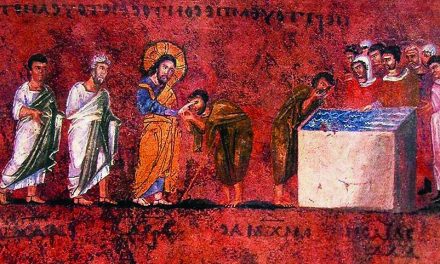Reading 1: Lv 19:1-2, 17-18, Responsorial Psalm: Ps 103:1-2, 3-4, 8, 10, 12-13, Reading 2: 1 Cor 3:16-23, Gospel: Mt 5:38-48
“Be holy, for I, the Lord, your God, am holy.”
“Be perfect, just as your heavenly Father is perfect.”
These are daunting statements. If we are perfect, we will be the best, the best athlete, the best parent, the best worker, the best whatever. We will not make mistakes. We will do what is right. We will succeed and not fail.
This perfection seems impossible. How can we rise above everyone else and stand alone as paragons of perfection? I am a father. I get frustrated with picking up socks strewn about the house, packing lunches day in and day out for the whole school year, and spending hours driving kids to their activities. By 7:00 PM, I just want to be left alone. I’m a teacher. Every week, I stand in front of my students discussing the material, but, in the back of my mind, I’m thinking, “I should have reviewed that more”, “I should have organized the lesson plan differently”, and “I’m not getting through to them.” And these are the good days when I haven’t lost my temper, become defensive, or been intentionally neglectful.
Be perfect? Be holy? I never am, so it sounds like being kicked when I’m down.
Yet, this way of understanding perfection and holiness is a worldly way of thinking, and St. Paul warns us against the wisdom of the world. “If any one among you considers himself wise in this age, let him become a fool, so as to become wise. For the wisdom of this world is foolishness in the eyes of God.”
God’s perfection and holiness looks different than perfection as success.
In Leviticus, the first reading, holiness consists of not hating “your brother or sister in your heart,” of taking “no revenge and cherish no grudge against any of your people,” and of loving your neighbor as yourself.
The responsorial psalm insists that God is blessed, is perfect, because God pardons, heals, redeems, shows kindness and mercy, does not hold onto our transgressions but sends them “as far as the east is from the west.” God’s holiness means being “slow to anger and abounding in kindness.”
In the gospel reading, Jesus preaches on perfection.
You have heard that it was said,
You shall love your neighbor and hate your enemy.
But I say to you, love your enemies
and pray for those who persecute you,
that you may be children of your heavenly Father,
for he makes his sun rise on the bad and the good,
and causes rain to fall on the just and the unjust.
God’s perfection does not mean a personal excellence and achievement. Rather, it means being in right relationships with others, loving relationships. It is kindness and mercy, forgiveness and healing. God’s holiness is loving “those who love you” as well as loving “your enemies.”
As a parent, then, perfection does not mean my children get all A’s but that I must be merciful when they don’t clean their rooms. Perfection as a parent means loving my children as best I can and accepting mercy and forgiveness for my failures.
As a teacher, perfection does not mean that my lessons are inspirational but that they are rooted in compassion. It means I teach because I truly care about my students. It means having mercy on those who are less than engaged and hoping that I will be forgiven when my teaching is less than good.
While not everyone is a parent or teacher, every Christian is called to perfection. This perfection is not achieved through worldly success. Instead, it is achieved by not hating, not taking revenge, pardoning, healing, being “slow in anger and abounding in kindness”, turning the other check, praying for those who persecute us, and loving friend, neighbor and enemy. These are the ways in which we restore our relationships with one another. These are the ways we become perfect as God is perfect. For God is love, and these are the ways of love.





